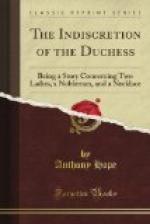I have been candid throughout, and I will be candid now—even though my plain speaking strikes not at myself, but at Marie, who must forgive me as best she may. For I believe she meant to marry me from the very first; and I doubt whether if I had taken the dismissal she gave, I should have been allowed to go far on my solitary way. Indeed I think she did but want to hear me say how that all she urged was lighter than a feather against my love for her, and, if that were her desire, she was gratified to the full; seeing that for a moment she frightened me, and I outdid every lover since the world began (it cannot be that I deceive myself in thinking that) in vehemence and insistence. So that she reproved me, adding:
“You can hardly speak the truth in all that you say: for at first, you know, you were more than half in love with the Duchess of Saint-Maclou.”
For a moment I was silenced. Then I looked at Marie: and I found in her words no more a rebuke, but a provocation—aye, a challenge to prove that by no possibility could I, who loved her so passionately, ever have been so much as half in love with any woman in the whole world, the Duchess of Saint-Maclou not excepted. And prove it I did that morning in the burial ground of the convent, to my own complete satisfaction, and thereby overcame the last doubts which afflicted Marie Delhasse.
And if, in spite of that most exhaustive and satisfactory proof, the thing proved remained not much more true than the thing disproved—why, it is not my fault. For Love has a virtue of oblivion—yes, and a better still: that which is past he, exceeding in power all Olympus besides, makes as though it had never been, never could have been, and was from the first entirely impossible, absurd, and inconceivable. And for an instance of what I say—if indeed a further example than my own be needed, which should not be the case—let us look at the Duchess of Saint-Maclou herself.
For, if I were half in love with the duchess, which I by no means admit, modesty shall not blind me from holding that the duchess was as good a half in love with me. Yet, when I had been married to Marie Delhasse some six months, I received a letter from my good friend Gustave de Berensac, informing me of his approaching union with Mme. de Saint-Maclou. And, if I might judge from Gustave’s letter, he repudiated utterly the idea which I have ventured to suggest concerning the duchess.
Two other facts Gustave mentioned—both of them, I think, with a touch of apology. The first was that the duchess, being unable to endure the horrible associations now indissolubly connected with the Cardinal’s Necklace, of which she had become owner for the term of her life—
“What? Won’t she wear it?” asked my wife at this point: she was (as wives will) leaning over my shoulder as I read the letter.
It was what I also had expected to read; but what I did read was that the duchess, ingeniously contriving to save both her feelings and her diamonds, had caused the stones to be set in a tiara—“which,” continued Gustave (I am sure he was much in love) “will not have any of the unpleasant associations connected with the necklace.”




